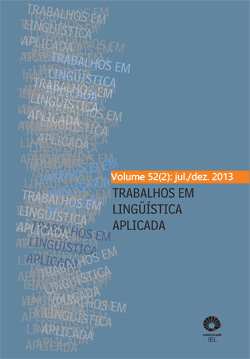Resumo
Este artigo, publicado originalmente em uma coletânea em 1987, aborda criticamente a noção de “comunidade linguística” em diferentes abordagens dos estudos da linguagem, do Gerativismo à Análise do Discurso, passando pela Sociolinguística e pela Crítica Literária. Discutindo a distância entre a homogeneidade da comunidade linguística imaginada (no sentido de Anderson) e a realidade fraturada da experiência linguística nas sociedades modernas estratificadas, este texto propõe uma mudança de abordagem para os estudos da linguagem, defende o fim das utopias linguísticas e o reconhecimento urgente de uma linguística do contato.
ABSTRACT
Originally published in a collection in 1987, this article provides a critical discussion of the notion of “linguistic community” in different approaches of language studies, from Generative Theory to Discourse Analysis, including Sociolinguistics and Literary Criticism. In a debate about the distance between the homogeneity of the imagined linguistic community (in Anderson’s sense) and the fractured reality of linguistic experience in modern stratified societies, the text proposes a change in the approach to language studies and advocates the end of linguistic utopias, as well as the urgent recognition of a linguistics of contact.
Keywords: linguistic community; imagined community; contact
Referências
ALLEN, L. (1985). Liberty.
ANDERSON, B. (1983). Imagined communities: reflections on the origin and spread of nationalism. Lon BACH, K.; HARNISH, R. M. (1980). Linguistic communication and speech acts. Cambridge, MA.
BERNSTEIN, B. (1971). Class, codes and control. London.
BHABHA, H. (1985). Signs taken for wonders. Critical inquiry, v. 12, n. 1, pp. 144-164.
CARTER, R. (1986). A question of interpretation: an overview of some recent development in stylistics. In: D’Haen, T. (ed.). Linguistics and the study of literature. Amsterdam, pp.
-26.
CICOUREL, A. (1982). Language and belief in a medical setting. In: Byrnes, H. (ed.). Contemporary perceptions of language: interdisciplinary dimensions. Georgetown University Round Table, Washington, pp. 48-78.
COULTHARD, R. M. (1977). In introduction to discourse analysis. London.
COULTHARD, R. M.; MONTGOMERY, Martin (ed.). (1981). Studies in discourse analysis.
London.
FABIAN, J. (1985). Language on the road : notes on Swahili in two nineteenth-century travelogues. Hamburg.
FISH, S. (1980). Is there a text in this class? Cambridge, MA.
FOWLER, R. et al. (1979). Language and control. London.
GRICE, H. P. (1975). Logic and conversation. In: Cole, P.; Morgen (ed.). Syntax and semantics, v. 3: Speech Acts, New York, pp. 41-58.
HABERMAS, J. (1984). The theory of communicative action. v. 1. Trad.: Thomas MacCarthy, Boston.
HALLIDAY, M. A. K. (1977). Explorations in the functions of language. New York.
HALLIDAY, M. A. K; HASAN, R. (1976). Cohesion in English. New York.
HARDING, S. (1975). Women and words in a Spanish village. In: Reiter, R. (ed.). Toward an anthropology of women. Monthly Review Press.
HEALTH, S. (1983). Ways with words. Cambridge.
HEBDIGE, D. (1979). Subculture: the meaning of style. London.
HIATT, M. P. (1977). The way women write. New York.
HYMES, D. (1974). Foundations in Sociolinguistics: an ethnographic approach. Philadelphia.
JAMESON, F. (1981). The political unconscious: narrative as a socially symbolic act. New York.
KACHRU, B. (1984). The alchemy of English: social and functional power of non-native varieties. In: Kramarae, Cheris et al. (eds.). Language and power. Beverley Hills, pp.
-193.
KEY, M. R. (1977). Male/Female language. New Jersey.
KRAMARAE, C.; SCHULZ, M.; O’BARR, W. (eds.). (1984). Language and power. Beverley Hills.
LABOV, W. (1972). Language in the inner city. Philadelphia.
LAKOFF, R. (1975). Language and women’s place. New York.
LARSEN, W. W.; NGA, T. T. (1986). Shallow graves. New York.
MILLER, C.; SWIFT, K. (1977). Words and women. New York.
MODLESKY, T. (1981). The art of being off-center: daytime television and women’s work.
Tabloid, n. 4, pp. 18-24.
MOREAU, N. B. (1984). Education, ideology and class/sex identity. In: Kramarae, C.; Schulz, M.; O’Barr, W. (eds.). Language and power. Beverley Hills, pp. 43-61.
OCHS, E.; DURANTI, A. (1981). Literacy in a Samoan village. Lecture presented at Conference on Literacy and Language Use, 12-14 November, University of Southern California, Los Angeles.
PRATT, M. L. (1983). Interpretative strategies/strategic interpretations: Anglo-American reader-response criticism. Boundary 2, fall. [Reprinted In: Arac, J. (ed.). Postmodernism and Politics. Manchester, 1986, pp. 26-54].
PRATT, M. L. (1986). Ideology in speech act theory. Poetics today, v. 7, n. 1, pp.59-72.
RAFAEL, V. (1984). Contracting Christianity: conversion and translation in early Tagalog colonial society.
PhD Dissertation. Cornell University, Ithaca, New York.
SETH, V. (1986). The Golden Gate. New York.
SILVERMAN, D.; TORODE, B. (1980). The material word. London.
SPENDER, D. (1985). Man made language. London.
STEEDMAN, C.; URWIN, C.; WALKERDINE, V. (eds.). (1985). Language, gender and childhood.
History Workshop Series. London.
STUBBS, M. (1983). Discourse analysis: the sociolinguistic analysis of natural language. Oxford.
THORNE, B.; HENLEY, N. (eds.). (1975). Language and sex: difference and dominance. Rowley, Massachusetts.
THORNE, B.; KRAMARAE, C.; HENLEY, N. (eds.). (1983). Language, gender, and society.
Rowley, Massachusetts.
WILLIS, P. (1977). Learning to labour: how working class kids get working class jobs. Farnborough.
O periódico Trabalhos em Linguística Aplicada utiliza a licença do Creative Commons (CC), preservando assim, a integridade dos artigos em ambiente de acesso aberto, em que:
- A publicação se reserva o direito de efetuar, nos originais, alterações de ordem normativa, ortográfica e gramatical, com vistas a manter o padrão culto da língua, respeitando, porém, o estilo dos autores;
- Os originais não serão devolvidos aos autores;
- Os autores mantêm os direitos totais sobre seus trabalhos publicados na Trabalhos de Linguística Aplicada, ficando sua reimpressão total ou parcial, depósito ou republicação sujeita à indicação de primeira publicação na revista, por meio da licença CC-BY;
- Deve ser consignada a fonte de publicação original;
- As opiniões emitidas pelos autores dos artigos são de sua exclusiva responsabilidade.

